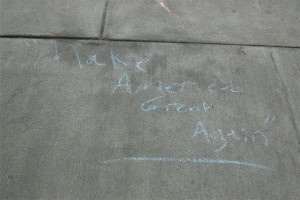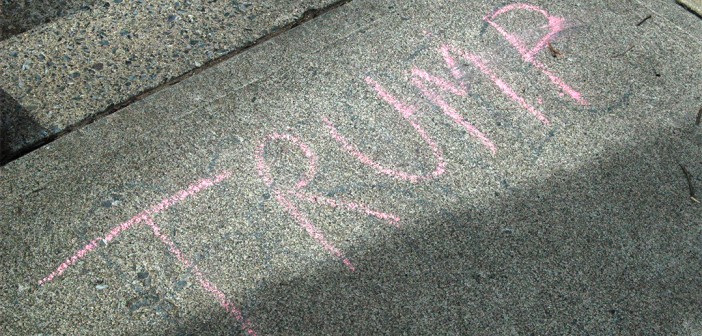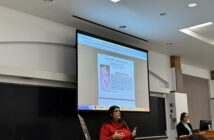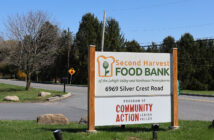
“Make America Great Again,” which is Donald Trump’s campaign slogan, has been written around campus in chalk. Trump has become a controversial politician in the past the year, with vocal supporters and detractors across the country and on campus. (Michael Ioannou/B&W Photo)
The ground is dotted with color each spring as the changing seasons give way to budding flowers and green grass. This week, these bright hues are popping up in unexpected places as the walkways around campus are colored with chalk. Student groups have taken to the ground to advertise concerts and lectures as well as express their political views.
Last week, political slogans were written in chalk around campus on Memorial Walkway and several steps, among other places. Phrases such as “Trump 2016” and “Make America Great Again” decorated the brick. While these chalk messages can be interpreted as advocating for a candidate, the messages might be interpreted as oppressive by those who feel attacked by some of the GOP frontrunner’s policies. Trump’s policies regarding immigration and torture, as well as his views on abortion and attitudes toward women have been contested.
Concerns regarding these Trump-supporting chalkings come after protests at Emory University in which students argued that similar chalk messages transcended beyond the slogans themselves and instead operated as “racial microaggressions” against several groups on campus.
The actions resulted in not only protests, but also discussions about free speech on college campuses nationwide.
“(Trump’s) rhetoric and many of his comments about women, people of color, Mexicans, the lower class and Muslims have created hostile atmospheres for a great majority of the people who identify with those categories and people who sympathize with those people,” Tamara Jones, ’17, said.
For Jones, the implications behind many of the chalk slogans and the anonymity of who was writing them were cause for concern. The first messages began to appear during the recent “Without Walls” project, which was a project associated with the Global Citizenship department where students wrote both positive and negative phrases and experiences on a wall. Jones said students were reflecting on past experiences in which they felt uncomfortable on campus when the messages were written.
Jones said the issue was less about supporting a candidate, and more about conducting political conversation in a productive and respectful manner.
“There is nothing wrong with supporting Donald Trump,” Jones said. “But ‘Build a Wall’ and ‘Make America Great Again’ took it to that point where it could be perceived as targeting certain groups of people in an attempt to assert that they are not welcome here.”
Political science professor Edward Morgan said it it is imperative members of the campus community uphold a climate of academic freedom and provide a space for students to express their opinions.
“It’s easy to express the speech you like,” Morgan said. “It’s very tricky to try and repress expression like that. That’s the test of the First Amendment.”
Morgan said if individuals want to discuss political topics or sensitive items regarding pro-Trump messages, there should be a space for students to meet and discuss their views face-to-face. He said some presidential candidates election cycle have expressed views that marginalize several groups, but denying their supporters a voice would hinder the possibility for a truly open academic environment.
Morgan also said the university’s ability to foster academic freedom and the freedom of expression shouldn’t be limited to an election year.
“Academic freedom is entirely crucial to a truly academic environment,” Morgan said. “Put your view out there and respond to it.”
Tyrone Russell, the director of the Office of Multicultural Affairs, emphasized the importance of a space where students can express their political ideas.
“If you truly stand behind something, then come to the table and let’s have a discussion,” Russell said. “If you’re willing to chalk up ‘Trump 2016,’ knowing what his platform is, then be willing to engage. And the same thing goes for people who may be against Trump.”
Russell explained how the climate of college campuses should be one that allows for discussion and the accessibility of different ideas. In comparing free speech to gun ownership, with rules and expectations placed on handlers for the good of society, Russell advocated for responsibility when expressing one’s views.
“All of our rights should be protected, including free speech,” Russell said. “The minute we start to stop people from having conversations and believing in these particular things is the minute that our education system ends.”






Comment policy
Comments posted to The Brown and White website are reviewed by a moderator before being approved. Incendiary speech or harassing language, including comments targeted at individuals, may be deemed unacceptable and not published. Spam and other soliciting will also be declined.
The Brown and White also reserves the right to not publish entirely anonymous comments.
1 Comment
When are we going to have the public discussion? If we plan it, I shall come and speak.